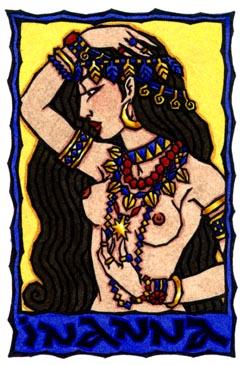 Wicca is about reimagining and re-cognizing God/dess, the Divine, the great Mystery at the heart of life. Witches offer an alternative to thinking of God as man, as Logos, as transcendent and separate from us, as ruler over nature, as object of belief rather than experience. A line from the Dar Williams song "The Christians and the Pagans" says,
Wicca is about reimagining and re-cognizing God/dess, the Divine, the great Mystery at the heart of life. Witches offer an alternative to thinking of God as man, as Logos, as transcendent and separate from us, as ruler over nature, as object of belief rather than experience. A line from the Dar Williams song "The Christians and the Pagans" says,You find magic from your God, and we find magic everywhere.
To become a Witch is to see with new eyes, to find magic where once we might have seen "God's will" or a disenchanted world. I know; I tried to live in a Christian world. I tried to make that theology fit my experience of life, but it always felt like I was imposing a structure from without. There were too many lacunae, too many gaps, too many things that Christianity couldn't explain to my satisfaction. It felt imposed on me. I also tried to live in the disenchanted world. Trained as an academic, I adopted a skeptical, rationalist, and scientific worldview that left no room for differing interpretations. I was angry a lot of the time, and very cynical. My creativity seemed locked up in a tight, dark box. In both cases, it was as if I were trying to cram myself into a garment too small, too scratchy, and ill-fitting.
Wicca isn't for everyone. We're not out to convert anyone. At the same time, we need to have a public face, to create a public space for ourselves, so that people know there are alternatives to the dominant patriarchal, monotheistic, Abrahamic religions. That is part of our work in a practical sense. More esoterically, we're creating a new imaginary - new realms for the imagination. Carol Christ explains in her excellent essay, "Why Women Need the Goddess."
Because religion has such a compelling hold on the deep psyches of so many people, feminists cannot afford to leave it in the hands of the fathers. Even people who no longer "believe in God" or participate in the institutional structure of patriarchal religion still may not be free of the power of the symbolism of God the Father. A symbol's effect does not depend on rational assent, for a symbol also function on levels of the psyche other than the rational. Religion fulfills deep psychic needs by providing symbols and rituals that enable people to cope with crisis situations in human life (death, evil, suffering) and to pass through life's important transitions (birth, sexuality, death).... Symbol systems cannot simply be rejected. They must be replaced. Where there is no replacement, the mind reverts to familiar structures at times of crisis, bafflement, or defeat.
If you're feeling caught in the dailiness of life, as if what you're doing has no larger meaning, remember that in your spiritual practice you re-form the very structures of the human imagination. Thus our spiritual work has important social effects. The world needs us and our way of seeing.
(Painting of Gaia found at Cedar Creek Clay)




3 comments:
I came to here via a link. You have a great place here. I am coming back to sift through all the info. I hope you do not mind if I link to you.
Blessings
Caz
http://www.blognow.com.au/caz/
Inanna, you wrote:
Trained as an academic, I adopted a skeptical, rationalist, and scientific worldview that left no room for differing interpretations. I was angry a lot of the time, and very cynical.
I know that worldview very very well-I've just recently come from there, too.
And it doesn't fit, does it?
Love,
Terri in Joburg
Hi -
This line really resonates with me:
" I was angry a lot of the time, and very cynical. "
I participated in a blog carnival for a while called "god 0r not" which was athists and theists, or in my case theasts, wrote about their view of a specified religious concept. I couldn't handle the anger of the atheists. The derision was ridiculous - it was all ranting and no reasoning. I support their rights, but I was very disappointed to be lumped in with the Xtians with these blanket pronouncements against religion that had nothing to do with my practice.
Good post, by the way, Merry Met.
Post a Comment